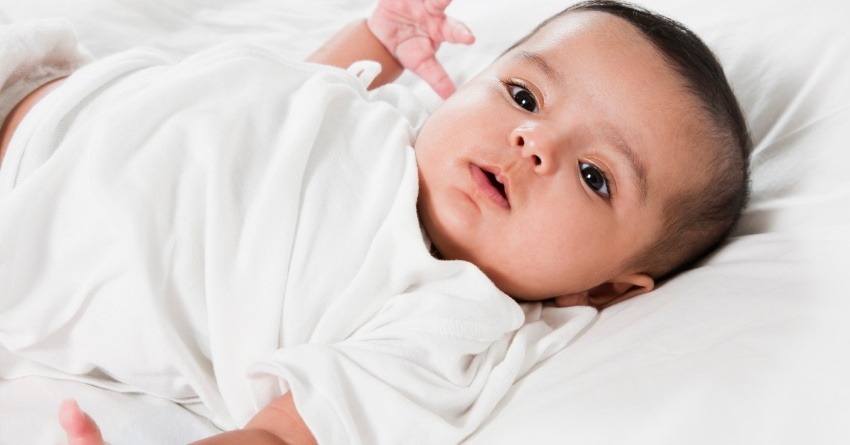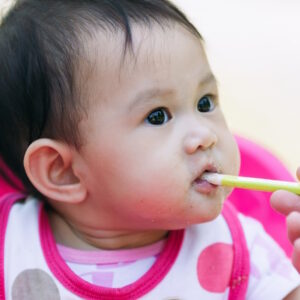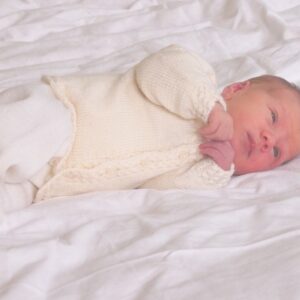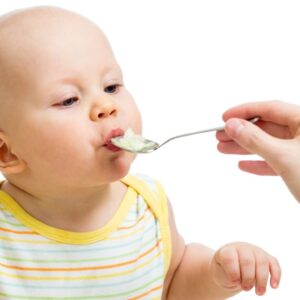Can babies pee too much or too often?
Let’s take a look at the possible causes of frequent urination in babies.

Mom’s Question:
My baby passes urine very frequently, and I am worried that she is ill. She is 4 months old and actually passes urine 2 to 3 times within half an hour! Can a baby pee too much? What could be the problem, and what should I do about it? Please help me!
Asma
Frequent Urination In Babies: A Problem Or Not?
In this article:
Babies do not have any bladder control yet, and with tiny bladders, which cannot hold their pee for a long period, you would expect them to go more frequently than adults.
Urination is a process of eliminating organic waste products from the body. In babies, control over their bladder is learned at 2 years up. Initially, a baby is born with a 10 ml bladder capacity. This increases as the baby grows. Considering your baby’s age, I would say, at 4 months, her bladder can only hold so little.
Let’s run through more details about the normal and abnormal problems in urination in babies.
1. Normal Frequent Urination in Babies
Your baby may urinate as often as every 1 to 3 hours or as infrequently as four to six times per day. This is an indication of a healthy bladder for their young age. Usually, this is a sign of a well-hydrated and essentially healthy baby.
Generally, a baby could produce about 6-8 diapers per day. However, this number can increase or decrease depending on their diet or intake.
The normal urine output for babies is about 2ml/kg/hour. In 24 hours, a baby can produce between 800 to 2,000 milliliters.
2. Urinary Tract Infection in Infants and Toddlers
Urinary tract infection (UTI) happens when bacteria accumulate parts of the urinary tract. Common sites for UTI are the bladder, urethra, ureters, and kidneys. This is the second most common type of infection in children; more common in girls.
Causes for UTI include:
- Poor hygiene or bathroom habits – not changing a wet diaper or underwear immediately or not wiping properly
- Frequent constipation or diarrhea
- Not urinating when they need to (“holding it”)
- Urinary tract obstruction (anatomical abnormalities)
Signs and symptoms of UTI in children are often non-specific. Normal urination should not cause pain or distress, so you should consider this when you see your infant in distress or fussy when urinating.
Fever is a common presenting symptom for babies with UTI. Other signs and symptoms include vomiting (more common in older children), blood in urine, lower back pain (in older children), urinary incontinence (also more common in toilet-trained children), loss of appetite, diarrhea, and burning sensation when urinating.
A less common type of UTI, known as pyelonephritis, which is an infection of the kidneys, can also present with an unresolved fever and chills, nausea and vomiting, back pain or abdominal pain, burning sensation or pain in urination, foul-smelling urine that is orange (blood-tinged) or dark cola color.
You should call your doctor once the fever doesn’t subside. Urinalysis and urine culture are common laboratory tests that doctors run to check the presence of bacteria in the urine. UTIs are treated with antibiotics. Your baby should be improving within a day or two.
3. Diabetes in Babies
Neonatal diabetes is characterized by persistent hyperglycemia (increased sugar level) within the first 6 months of life. This is due to an abnormality in the genes that affect the function of the pancreas in producing insulin. This disease can be permanent (lifetime hyperglycemia called permanent neonatal diabetes mellitus) or can resolve and reoccur later (known as transient neonatal diabetes mellitus).
Babies with this disease do not grow in-utero. The signs and symptoms include increased urination frequency and appetite, yet the baby may appear dehydrated. Diagnosis includes genetic testing, as this is caused by a gene mutation.
Like neonatal diabetes, Type 1 diabetes is an autoimmune disease in which the pancreas stops producing insulin. Insulin is the one that carries and distributes the sugar to different parts of the body. This is a rare disease for babies below 6 months of age.
Signs and symptoms include fatigue, constant hunger and thirst (leading to frequent urination), blurring vision, and fruity-smelling breath (in older children). However, these signs and symptoms are difficult to pinpoint in babies.
Do not confuse the two types of diabetes in babies. They may manifest the same signs and symptoms, but neonatal diabetes can occur as early as less than 12 weeks of age, while Type 1 diabetes occurs after 6 months of age.
Do consult your doctor immediately if you suspect your baby to have diabetes.
The video below explains common and less common symptoms of type 1 diabetes and includes families discussing their children’s experiences of having diabetes.
4. Overactive Bladder
A: Spastic Bladder Muscles
This condition is caused by uncontrollable spasms around the urinary bladder that cause urinary incontinence and frequent urination. This may be due to caffeine intake, anxiety or stress, infrequent urination (holding your urine for a long period), small bladder capacity, constipation, and anatomical abnormalities in the urinary tract.
Children often outgrow this condition. Learning bladder control as the child grows can resolve this condition. However, for kids who do not outgrow the condition, bladder training and medications can help. Avoiding caffeine and other ingredients that may cause a muscle spasm, taking their time to urinate, and having a proper voiding schedule work wonders for an overactive bladder.
B: Pollakiuria
Pollakiuria is defined as a daytime urinary frequency. This benign condition causes a previously toilet-trained child to have frequent small voiding episodes without the presence of infection or polyuria. This self-limiting condition occurs mostly between 3- to 14-year-old and lasts from 7 to 12 months.
The signs and symptoms include:
- Frequent urination that disrupts the normal voiding pattern
- The average interval of every 15 to 20 minutes, but it can occur every 3 minutes
- The color, smell, and stream of the urine are normal
- No other signs and symptoms observed
- Usually psychological-related
Treatment of this condition includes medications (anticholinergics) and identification of a possible trigger (emotional or psychological).
Baby Passes Urine Very Frequently: What to Do About it
As you can see, a baby who pees frequently does not necessarily indicate illness. It is most likely due to immature bladder control that makes your baby pee as frequently as you’ve mentioned.
If there is no fever, your baby is not in distress or fussy, and does not exhibit signs of dehydration, vomiting, or blood in the urine; then there is nothing to worry about.
Should you want to have him checked thoroughly though, you can call her doctor to discuss the matter.
Read Next about Babies that Pee Often:
I hope this helps,
Paula
Research References
- Neonatal Diabetes
- Signs of Diabetes in Toddlers, Babies & Infants
- Urinary Tract Infections in the Infant

Paula Dennholt founded Easy Baby Life in 2006 and has been a passionate parenting and pregnancy writer since then. Her parenting approach and writing are based on studies in cognitive-behavioral models and therapy for children and her experience as a mother and stepmother. Life as a parent has convinced her of how crucial it is to put relationships before rules. She strongly believes in positive parenting and a science-based approach.
Paula cooperates with a team of pediatricians who assist in reviewing and writing articles.





My baby born 24 hours happened but he’s not urine still please help me
Hi Prem,
You should check with your baby’s doctor, but newborn babies usually do not pee much at all in the beginning. You can read about newborn peeing here.
Congratulations on your baby!
My 8 year child often passes urine within ten to fifteen minutes gap….y is it so….is this normal.
Hi Vidya,
For how long has this been going on? Your child may have a urinary tract infection or an overactive bladder. There is also a condition called pollakiuria, which is basically when a child pees very frequently during daytime only. I think you should take your child to the doctor. An untreated urinary tract infection can spread to the kidneys, so this needs to be ruled out. The reasons for an overactive bladder should also be investigated. While most children simply grow out of an overactive bladder, it is still important to find out the underlying causes, if possible.
Good luck, and let us know what you found!
My Baby 45 days old he passes urine 15 times per day. any problem?
Hi Rajesh,
Being that young, peeing often is more likely to be a good sign of him feeding enough. :-)
My baby girl is 9 months old since today she is passing urine very frequently i.e. within 1/2 an hour. She earlier had a UTI at the age of 6 months. She is otherwise happy and active and feeding well. Is she normal or have any problem?
Is it normal that my baby’s urine is little,? like 2 diapers in a day. Sometimes it took up 10 hrs. To change her diaper but then a again its little. P. S my baby is 9months old.